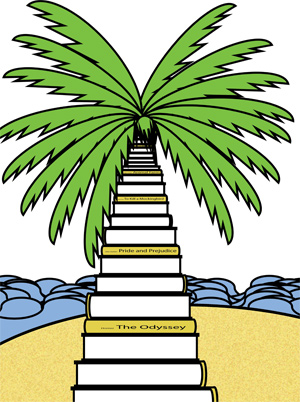Paperback paradise
Jessica Brossack
The Signal

Miles of blue water all around and sandy beaches as far as the eye can see. No telephones, televisions, computers or—egad—i-anything!
If you’re not lucky enough to be Tom Hanks in “Castaway” and marooned with a cargo shipment full of things to occupy yourself, what do you do?
Well, you would read. But what would you read? Even Tom Hanks wasn’t fortunate enough to find a book washed up on shore. A copy of “Robinson Crusoe” by Daniel Defoe would have been perfect for his character’s dilemma.
“What would you read on a desert island?” is the question the staff of the UHCL Alfred R. Neumann Library poses on its new blog entry located under “News from the Neumann” entitled ‘Desert Island Books.’
Martha Steele, associate director for public services, developed the idea after noticing that their blog didn’t really say anything specific about books.
“Most of the library staff are devoted readers and would be pleased to provide recommendations and book reviews,” Steele said, “but I suggested that we get recommendations from faculty. The opinions of your faculty of what is worthwhile reading will be of interest to many students.”
Steele enlisted the help of reference librarian Gerald Churchill to conduct interviews and write the blog.
Churchill contacted several faculty members for face-to-face interviews and sent out a small survey for those unable to meet face-to-face, with such questions as ‘Name a favorite book, Why is it a favorite?’ and ‘For you, what is a good book? What should it do?’
Christine Paul, director of foreign languages and continuing education, believes that the books she reads have to be well written, whether it’s Margaret Mitchell’s “Gone with the Wind,” or Bernard Schlink’s “The Homecoming.”
“Whenever possible, I enjoy reading books in their original language,” Paul said, who has the ability to read English, French, Spanish and German, and mentioned Irene Nemirovsky’s “Suite Francaise” as one of her favorites.
While many professors listed “To Kill a Mockingbird” as one of their favorite books Patricia Cuchens, lecturer in business writing, it has a personal tie.
In the 1960s, Cuchens and her family moved from Detroit, Mich., to Pensacola, Fla., where racial segregation was still very much in existence.
“Harper Lee’s book was one of many touchstones of the Civil Rights era.” Cuchens said. “Although the story takes place in an earlier time period, ‘To Kill a Mockingbird’ strongly affected people in the 60s and 70s. However, the death of Emmett Till [a 14-year-old black teenager who was tortured and killed in rural Mississippi] in 1955 –five years after Harper Lee’s book was published– was one piece of strong evidence of the book’s relevant theme.”
The Cuchens family moved from inner-city Detroit where she attended an integrated school, to the suburban South with a segregated school.
“A few years later, when I first read the book, I was surprised by all the references I could understand.” Cuchens said.
Even now, she says, when she reads that book, she is reminded of how she felt at that time in her life.
While that book holds a poignant place in Cuchens’ life, she does say that a person reading it today would probably not be affected the same way, nor does the book have the same impact as it did in the ‘60s, but Cuchens thinks it would still generate debate and discussion in the classroom where the book is still regularly taught.
Both Steele and Churchill said that they have been surprised by the recommendations made by faculty and, in writing the blog, they have been exposed to, and enjoyed reading, some books they had never previously considered.
Churchill said he really enjoyed reading “All Quiet on the Western Front” and “Madame Bovary” which were listed by Associate Professor of History, Barbara Hales, as well as “the Armada,” recommended by Professor of History Jonathan Zophy, both of whom have entries on the library blog.
At this point, only faculty responses have been highlighted in the “Desert Island Book” blog series, but students, staff and all faculty members are encouraged to participate.
“It is my hope to one day have President Staples submit an entry.” Steele said.
To read all of the entries of the blog participants or to participate yourself, log on to www.uhcl.edu/library and scroll to the bottom left corner of the page, click on the green and white “Read our Blog/News from the Neumann” link, or contact Gerald Churchill directly at Churchill@uhcl.edu.

